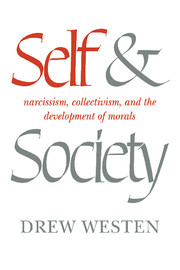Book contents
- Frontmatter
- Contents
- Preface
- Part I A theory of personality
- Part II A theory of culture
- Part III Personality and culture: a synthesis
- 8 Culture and personality: dying species or vigorous hybrid?
- 9 Psychic and sociocultural structure and dynamics
- 10 Personality and communitarian collectivism
- 11 The psychodynamics of modernization
- 12 Personality and sociocultural change
- 13 Breakdown and recovery: paradigmatic processes in personal identity and cultural integration
- 14 Personality and individuation
- References
- Index
14 - Personality and individuation
Published online by Cambridge University Press: 11 November 2009
- Frontmatter
- Contents
- Preface
- Part I A theory of personality
- Part II A theory of culture
- Part III Personality and culture: a synthesis
- 8 Culture and personality: dying species or vigorous hybrid?
- 9 Psychic and sociocultural structure and dynamics
- 10 Personality and communitarian collectivism
- 11 The psychodynamics of modernization
- 12 Personality and sociocultural change
- 13 Breakdown and recovery: paradigmatic processes in personal identity and cultural integration
- 14 Personality and individuation
- References
- Index
Summary
The aim of Part III has been to integrate the theory of personality A proposed in this book with the theory of culture. The last four chapters have examined the relationship been personality processes, communitarian collectivist culture, and social change. This final chapter will explore the psychology of individuated collectivism and will conclude with a brief discussion of moral individuation in psychological and socio cultural perspective.
The literature on the psychodynamics of modernization discussed in Chapter 11 provides one set of indicators of a shift toward self-orientation that occurs with modernization. A second line of evidence, especially convincing because of its methodological rigor and the broad scope of its authors' knowledge, comes from the Six-Culture study by John and Beatrice Whiting and their colleagues. This research involved intensive field work over a number of years by a team of researchers interested in the relationship between child rearing, personality, and culture. The investigators coded interpersonal interactions on a number of dimensions for children and their parents in six cultures with varying subsistence patterns. Particularly relevant from the standpoint of the thesis developed here is the variable of altruistic versus egoistic children's social behavior. Whiting and Whiting (1973, 1975) found a strong correlation between this dimension and sociocultural complexity (institutional differentiation and technological development), such that egoistic social behaviors correlated highly with complexity. The Whitings suggest that a key variable in explaining that difference is the mother's workload. In simpler societies, the mother has less time for the child, and the child must take on more household responsibilities, such as caring for younger children.
- Type
- Chapter
- Information
- Self and SocietyNarcissism, Collectivism, and the Development of Morals, pp. 386 - 393Publisher: Cambridge University PressPrint publication year: 1985



